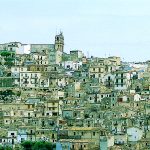Facing the global crisis and the water crisis with the knowledge of the places and the knowledge of the communities
Torrential rains, whirlwinds, sudden floods, landslides, hydrogeological instability and water crises hit our territory more and more frequently. The gradual increase in the average temperature of the planet due to the greenhouse effect, due to the emissions of fossil fuels from the industrial era, is a certain fact now. When the temperature rises, energy in circulation increases, evaporation, and the movement of air masses that can lead to violent storms with heavy rains and flash floods in winter and drought and extreme heat waves in summer. These events are grafted onto a situation of soil degradation, abandonment of traditional agriculture, occupation of space and creation of large infrastructures that make the environment no longer able to counterbalance meteorological phenomena and water from charity becomes a factor of disaster. It is clear that the situation is due to the overbuilding of the river beds, to the construction in alluvial zones, to the exodus from the mountain areas, to the abandonment of traditional techniques of forest management and soil conservation, to the creation of large dams and emigration. The global crisis, which is economic, climatic and environmental, cannot be solved by applying the methods that have caused it: technocracy, waste of resources, undifferentiated approach for all countries, solutions lowered from above. To face the global crisis, a new paradigm is needed and scholars, researchers, international organizations, have developed various strategies: sustainable development, the green economy, a third industrial revolution based on alternative energy sources, zero emissions, zero km, the slow economy, degrowth. These are all highly topical propositions. Important is the awareness that change can only be achieved with knowledge. The answers must not be unambiguous and equal on an international level but each one must be adapted to specific places and from these originate thanks to the material and immaterial heritage of cultural and natural diversity and local characteristics. Climate change, the collapse of ecosystems, cataclysms, the end of civilization are conditions that humanity has had to face numerous times. Survival has been assured by the preservation of the traditional knowledge system. This contains the wisdom of places and communities, the ancient knowledge of humanity, the deepest layer on which science and culture have developed, the local solutions that have allowed the creation and management of landscapes on the entire surface of the planet . Exceptional places such as the Cilento Park and the Amalfi Coast, both listed on the UNESCO World Heritage list, are a reservoir of techniques and knowledge useful today for common survival. This knowledge allows the development of solutions with a low use of energy and resources that are able to adapt to environmental variability and to react to emergencies and catastrophes in a flexible and multi-functional way. And yet the terraced systems of Salerno and Amalfi, which are the structural support of places of the highest value like Capri, are now abandoned, causing the collapse of entire territorial areas. Faced with the global crisis, new sustainable solutions are indispensable in the fields of urban planning, housing, soil conservation, water production and recycling. They can be elaborated by understanding the message present in every community, place and environment. A vast program of naturalistic engineering and landscape architecture will find the necessary economic resources because it is an investment in common goods and the future and will give work to everyone: experts, young people, immigrants to travel the places, extract their knowledge, reapply them in an innovative way, transform our Mediterranean environments those gardens of harmony and knowledge, a fusion of nature and culture that used to be.









